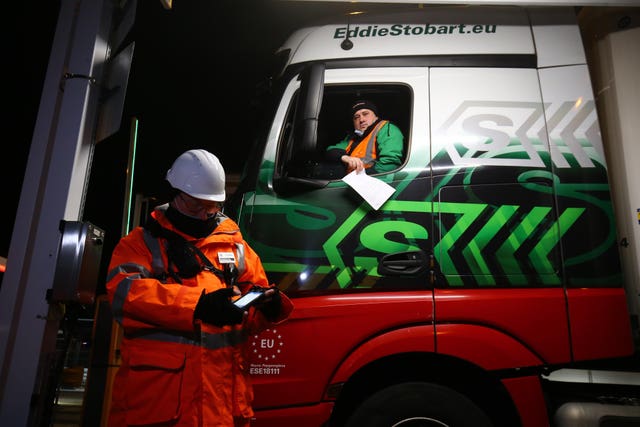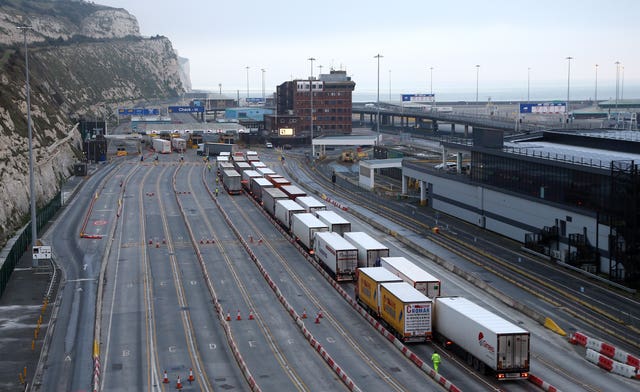Johnson says UK has ‘taken back control’ as post-Brexit EU deal comes into force
Boris Johnson said the ’47-year experiment’ of European Union membership has given way to a new global perspective.

The UK has begun a new future outside the European Union’s trading structures, with Boris Johnson saying it offers the chance to “transform our country”.
There will be disruption as a result of the increased bureaucracy between the UK and its largest trading partner, but there was little sign of the chaos some had feared on January 1.
And the Prime Minister said the UK has “taken back control of our money, our laws and our waters” after the Brexit transition period with the European Union came to an end at 11pm on December 31.
Lower trade volumes on the New Year’s Day bank holiday could mean the full impact of the new regime is yet be felt, but freight appeared to be moving freely at the borders with Ireland and France under the new arrangements.
Mr Johnson said the decision to leave the single market and customs union ended a “47-year experiment” of European Union membership.
He said the EU had provided the UK with a “safe European home” during the 1970s, but the country has now “changed out of all recognition” with global perspectives.
The UK is “free to do things differently, and if necessary better, than our friends in the EU” in 2021, he said in a video message to mark New Year.
As well as the Christmas Eve deal with Brussels, the UK has reached several agreements with non-EU countries – such as Japan – to ensure continuity of trading arrangements for British companies from January 1.
Mr Johnson, writing in the Daily Telegraph, said the “great new deal” with the EU honours the “most basic promises” of the 2016 referendum, and added that the UK has “taken back control of our money, our laws and our waters”.
“And yet it is also the essence of this treaty that it provides certainty for UK business and industry, because it means that we can continue to trade freely – with zero tariffs and zero quotas – with the EU.”
In a sign that the UK will break away from the EU rules it inherited, Mr Johnson said: “We need the Brexit-given chance to turbocharge those sectors in which we excel, to do things differently and to do them better.”
Ireland’s foreign minister, Simon Coveney, said the change in trading arrangements with the UK will inevitably cause disruption.
He told BBC Radio 4’s Today programme: “We’re now going to see the 80 billion euro (£71.2 billion) worth of trade across the Irish Sea between Britain and Ireland disrupted by an awful lot more checks and declarations, and bureaucracy and paperwork, and cost and delay.”
Ferry operator Stena Line said six freight loads destined for Ireland had been turned away at Holyhead due to incorrect paperwork.
Scotland’s First Minister Nicola Sturgeon said the EU should be ready to welcome an independent Scotland back into the bloc.
“Scotland will be back soon, Europe. Keep the light on,” she said.
Scottish voters did not back Brexit and the First Minister views it as a major issue in her campaign to break away from the UK.
Under the new arrangements, freedom of movement rights end and, while UK citizens can still travel for work or pleasure, there are different rules.
Passports must be valid for more than six months, visas or permits may be needed for long stays, pets need a health certificate and drivers need extra documents.

The automatic right to live and work in the EU also ceases, and the UK will no longer take part in the Erasmus student exchange programme.
Hauliers face new rules and lorry drivers heading for the Continent must have a Kent Access Permit before entering the county in an effort to curb tailbacks on cross-Channel routes.
Travel to Ireland does not change, but the Northern Ireland Protocol means Northern Ireland remains in the EU single market for goods and will apply EU customs rules at its ports, even though the region is still part of the UK customs territory.
The protocol will also see Northern Ireland follow certain EU rules on state aid and VAT.

Gibraltar, whose sovereignty is disputed by Spain and Britain, remains subject to the rules of the free-travel Schengen area, keeping the border with Spain open.
Government officials insisted the necessary border systems and infrastructure in the UK are in place.
Big Ben chimed at 11pm, when the Prime Minister is understood to have marked the occasion with his family in Downing Street.
Celebrations were muted by the coronavirus pandemic but Eurosceptic MPs, once derided as fringe eccentrics on the margins of the Conservative Party, expressed their delight.
Sir Bill Cash said it was a “victory for democracy and sovereignty”, while Sir John Redwood said he looked forward to using the “new freedoms and opportunities now open to global Britain”.
Former Ukip leader Nigel Farage, who played a key role in the 2016 referendum, told the PA news agency: “Yes, we spare a thought for Northern Ireland and our fishermen, but this is a moment to celebrate 2021 as an independent United Kingdom. It’s a shame the pubs aren’t open.”





